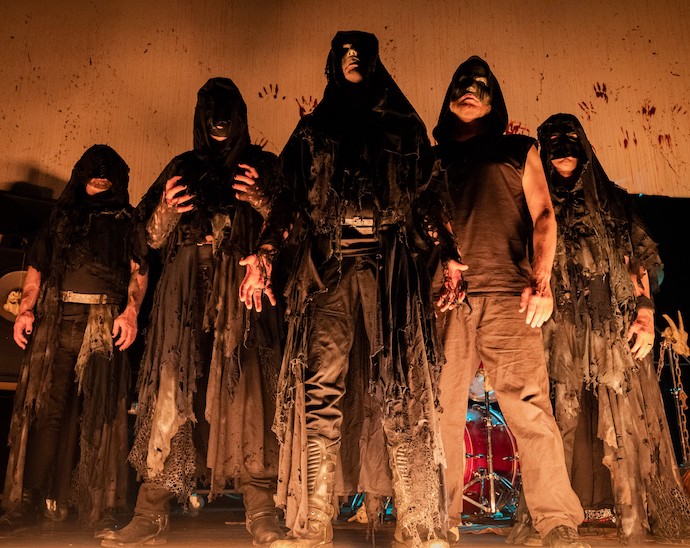
(In the interview we present here, Comrade Aleks spoke with Arnhwald R., vocalist/guitarist in the French band Deathcode Society, whose latest album Unlightenment was released on November 24th of this year by Osmose Productions, and is well worth your time.)
How many bands do you know that use deep-sea fishes on their artwork? Diceratiidae especially… And as Diceratiidae, or any other anglerfishes, lure small fishes with their bioluminescence, so the French black metal band Deathcode Society lures listeners with the image of a hellish Diceratiidae on their new album Unightenment.
It’s the band’s second album, and as Nicolas S. (bass), Grégoire G. (drums), David C. (guitars), Arnhwald R. (vocals, guitars), and Mike Barber (guitars) are busy with other bands and projects, it took some time before they finished this one.
Honestly, I’m suspicious of metal subgenres that are tagged as “symphonic”, but Deathcode Society’s Unightenment is balanced regarding the presence of orchestrations. The fish, the name of the opening song “Scolopendra”, the video they shot for it – everything points to the band’s creativity and artistic approach to their craft. Why not discuss this?

Hi Deathcode Society! How are you? Who’s online today?
Hi, Arnhwald is online and so far things are OK.
Arnhwald! Nice to meet you, then the first question is… how soon will Ecclesia release a new album?
Yes, the new album is set to be released in February/March! Expect something wild!
Good news! Then we’ll have an opportunity to talk again soon. Okay, and now back to the matter of our interview. All of you, excluding David C., play in different bands besides Deathcode Society. Was it a reason why there was such a long break between Eschatonizer and Unightenment?
David also play in other bands, but maybe Metal Archive did not track him yet (smile). I think that the fact that I’m involved in various projects in which I have a creative input slowed down a bit the tempo, you are right. Between Eschatonizer and Unlightenment, eight years were not wasted since I released an album with the bands Ecclesia and Glaciation, both albums I also produced in my own studio. It takes time when you are demanding with quality.
Did the process of Unightenment’s composition stretch over all these seven to eight years, or did it happen in a shorter period of time through a series of intense rehearsals?
It was both stretched and shorter than that. We started to write new material in summer 2017, but it was a bit of a start and stop process. Songs could be finished in a quite quick time but sometimes I got stuck and could not find a suitable solution for the song I was writing. In a way, creation itself dictates its own temporality. There are things that just came to life at the very end of the recording process, for example, things that were so obvious that you could not imagine the song without them, but just magically appeared in front of me as if having always been there, but kind of hidden out of reach. This album being more spontaneous than the former one, I just let it grow until completion, like a sort of plant.
Can you give an example of such sudden solutions you found recording the album?
Many, I would say. One of the most prominent examples could be the clean voice part of “Narcosis” coda. “Narcosis” is the song that took the longest to be completed, by the way, since everything was in my head but not really demoed. We can say it took its definitive shape through the production, and was really achieved at the mixing stage of the album.
Also do I get you correctly that all of you could offer a song and work separately over their own ideas?
Yes, everybody is free to showcase ideas; it can be whole songs or just riffs. Then I usually work on them to give them their final shape. My role is to refine the raw material.
What was your vision? How did you want to see the new album when you entered the studio? Did you have specific requirements for the sound in general?
Yes, I had ideas about how the album had to sound. Eschatonizer had a modern and stellar production job, handled by Dave Otero, who is one of the top extreme metal producers, and we can’t thank him enough for his help. We would have liked to push the process further with him, though in another aesthetical direction, but our budget was a bit too tight. It was a lot of pressure on my shoulders to look after Unlightenment’s technical production by the way.
We were after a less clinical approach, and a darker and more “live” sound. A dark clarity, if that makes sense. I think we managed to get what we wanted.
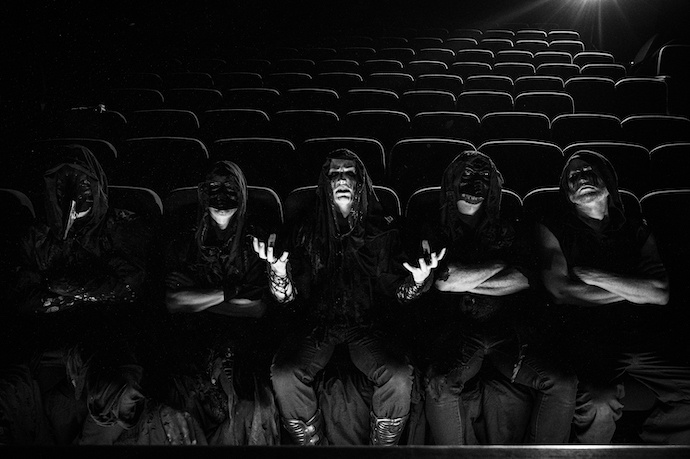
Yes, I see your point. But what do you mean as you speak about another aesthetical direction?
Eschatonizer sounds really modern and clean. We wanted something a bit rawer and old-school sounding, less polished, and lay the stress on the atmospheres.
The album has very specific artwork, and the first track that heralded the Unightenment release is “Scolopendra”. Why did you choose these images to reflect the nature of the material? How did you work through the concept of the official video?
Of course, we had to find a kind of middle ground between “Scolopendra”‘s first visual and the album cover. Vergvoktre, the nightmare painter, was hired by us for that first artwork and it perfectly filled the conceptual gap.
The official video was thought of as a story more than a musical video clip. We’ve been helped by the fact we had the chance to access an old movie theater that had to be destroyed two weeks later! We kind of wrote the scenario around that haunted theater, which became a metaphor of our music and thematic universe.
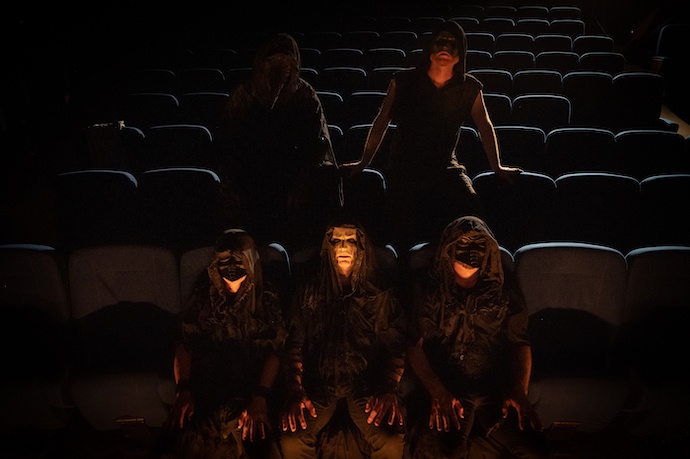
Yes, I was a bit surprised how well you used surroundings in this video. So… how do you see the key differences between Eschatonizer and Unightenment?
Eschatonizer is colder and seems a bit less emotionally expressive, I’d say. There are no deep differences as far as writing is concerned, but the overall musical performances are more intense on Unlightenment. It is easy to feel that we have played together as a live band on this one. Thus, our last album has better and stronger arrangements, and relies more on contrasts and atmospheres. I think we went in the right direction: darker, more intense, weirder too.
Orchestrations and symphonic arrangements can both benefit or ruin an album. How do you decide when it’s enough? And do you have some bands of that kind that really inspired you?
I agree with you and nine times out of ten it ruins the music. I would say Anorexia Nervosa was the band who showed me it could be possible to use an orchestra to bring more intensity to the music, and not to soften it. My sources of inspiration are more to be found in the XIX/XXth century, among the masters of late romantic symphony such as Anton Bruckner, for example. I’d say deciding when it is enough is indeed the hardest thing. It’s a trial and errors process more than something than can be planned.
On Unlightenment we worked with Victor Malcey, a French composer who knows orchestration, and who worked with me in order to respect a couple of orchestrating rules, so everything could sound with maximum realism.
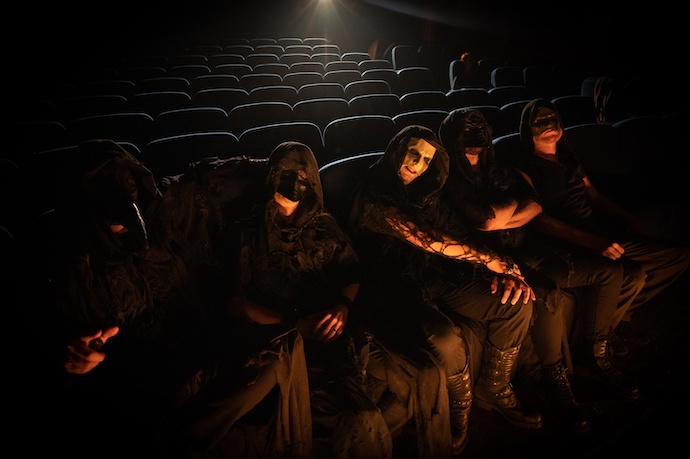
Did you record orchestrations for the previous albums on your own? How much did it differ when you worked with Victor?
Yes, I looked after all the orchestrations on the former album. It did not differ so much this time. The only difference is that instead of fine-tuning everything and taking time to find the good instrument on my own, I loaded a “string ensemble” vst or a “brass ensemble”, wrote the parts, then sent the whole to Victor who then distributed the voices inside the groups and divided them into instruments – for the brass for example we have French horns, trumpets, trombones, tubas, so on for the woodwinds, the strings section, etc. Victor also corrected a couple of writing mistakes that remained. Orchestrating is a real job, it is not something you improvise.
I did it on my own on Eschatonizer but I think we had to benefit from the experience of a real expert for the new album.
Deathcode Society’s music is damn charged and intense, and like almost any extreme metal, it demands proper delivery. Do you try to keep yourself in good shape to perform it at full capacity, or is it ok without any extra efforts?
It is a lot of work and, I’d say, even devotion. Hours and hours of practice, for all of us. A couple of members in the band are professional musicians or make a living out of teaching music, so in a way music practice has also become a part of our ordinary life.
The live album The Armageddon Carnival was released in 2018. It’s dedicated to your former guitarist Franz E., who passed away on the 11th of March 2018. How is the opportunity to perform live with Deathcode Society important for you? Do you have some fun, or is it a necessary evil?
Well, it really depends. Some concerts are absolute blasts, there is something very powerful in the air and we know then that what we do is impressive and really strong. Sometimes it does not work as well.
I like attending concerts and I like playing live, that’s something important for me. But I could also imagine a world where Deathcode Society would act like Abigor and never perform on stage. Sometimes I’m tired when I see that the material conditions don’t really allow us to showcase our music under the best conditions. By the way, our band was never intended to become a live act – circumstances and opportunities made it. It was almost not a decision.
Two of your new songs are based on poems by Andrew Joron and René Daumal. How much do you care about your own lyrics? Do you have a higher criterion?
Lyrics are important because they articulate the emotions conveyed, they kind of channel them and give them a semantic form. As someone who studied literature, I’m also very much concerned by the words and I could not imagine singing dumb stuff. We take our time to chose our words and I have the chance to have been helped on Unlightenment by fabulous lyrics writers. It brings another dimension to the band. Some could find pretentious that we adapt poetry or even expect our music to carry poetic contents, but I think Extreme Metal should also rhyme with Extreme Demands.
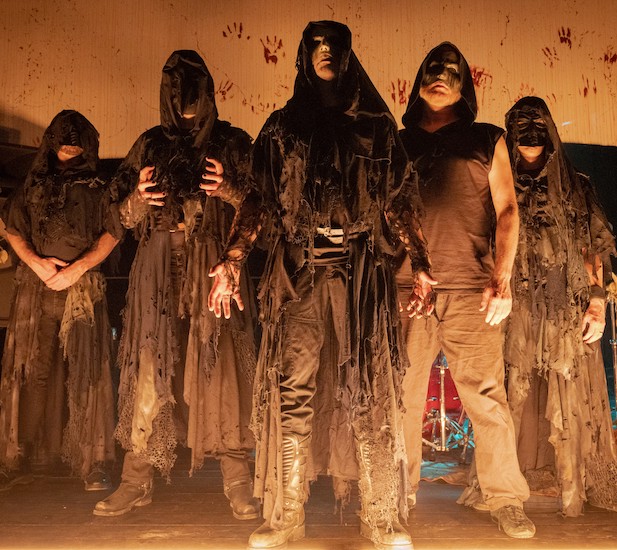
Andrew Joron is known for his science-fiction poetry – which aspects of this genre draw your attention? How does it work with your music?
Andrew was known because he used Science Fiction, which is a narrative genre, as a poetic surrealism topos, which is very original since nobody did it before him. “Mazed Interior” is pure madness, it’s really something to behold, since the author uses the words as if they were pieces of a machine, and as if language was one of those incredible technological artifacts you meet in SF novels. It also carries a special sense of darkness and tragedy that seduced us and was 100% fitting to the song we were writing, which is a bit more technical and tricky than the others ones on the album.
And how did you choose René Daumal? His life was so short, and he left not so much after him. Is he well-known in France?
René Daumal is not that well known, except for the literature experts or really schooled people, unfortunately. He was an interesting poet, a kind of mystical surrealist who refused to follow the kind of materialist and bourgeois path of the official surrealism movement. He had higher ideals and thought that poetry and literature were pathes towards the Absolute. I read “A la Néante” once and it struck me how powerful and tragic the poem was. Then I read other stuff by him and noticed that he recommended his poetry to be shouted rather than read – so did I (smile). It is also a way for us to build links between our music and what I would call the never-ending dialogue between works of art, and to insert our project inside something larger and deeper than just five guys playing in a garage.
You live in Annecy, “Pearl of the French Alps”. How do the surroundings influence you? Does the region have the same problems as other parts of France?
Annecy is a quite rich part of France because of the proximity of Geneva, so the problems are a bit different than in other parts of France. It’s hard to live there when you are not rich – the middle class suffers a bit, I mean the people who have decent incomes by average French standards are kind of socially downgraded.
I’ve been living there since I’m a kid and I obviously see it change. As far as I’m concerned, I live in the countryside: the place here is nice, not yet devastated by urbanism, and the surroundings there still have that romantic vibe I love. Of course the mountains, snow, and lakes are a source of musical inspiration. It’s not a cliché for me. 3/4 of my musical ideas are developed while I’m walking outside. I take my smartphone and record riffs I sing when I’m wandering around my home. This environment is deeply inspiring.
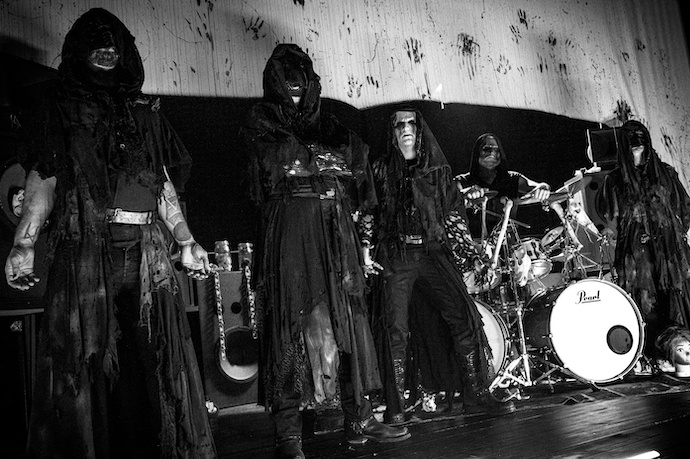
From the start Deathcode Society has been with Osmose. How do you see the band’s prospects? How do you see the next level you can reach? It’s not about albums’ sales, so I wonder how we can value the band’s success besides taking part in some big festivals like Hellfest.
It’s hard to tell. What has been important to us was never gaining success through being fake and by using marketing artifacts. We want to be known because of the quality of our music, not because we are considered fancy or trendy. So far our fan base is ever-growing and the reception of our second album has been nothing less that spectacular in that regard. People write us to share their enthusiasm and say how much this album, for them, makes a difference. So, yes, obviously we have projects, but we are also using the wind to sail, and nobody can foresee its direction and force.
We had played at the Hellfest in 2017 and had a blast, and indeed major events such as big European festivals are a goal, but we don’t control everything and we let our booking agency work for us.
What are your further plans for Deathcode Society?
The immediate plans include rehearsal to be able to deliver our new songs live. Then, we want to play live, and write more songs by listening to what howls in the aether.
Okay, thanks for the interview Arnhwald. Good luck with rehearsal and spreading the word. Did we skip something?
Thank you for the time you spent asking us all these questions. It seems you gave us the opportunity to clear up everything one could wonder about Unlightenment.
https://www.facebook.com/DeathcodeSociety
https://deathcodesociety.bandcamp.com/
